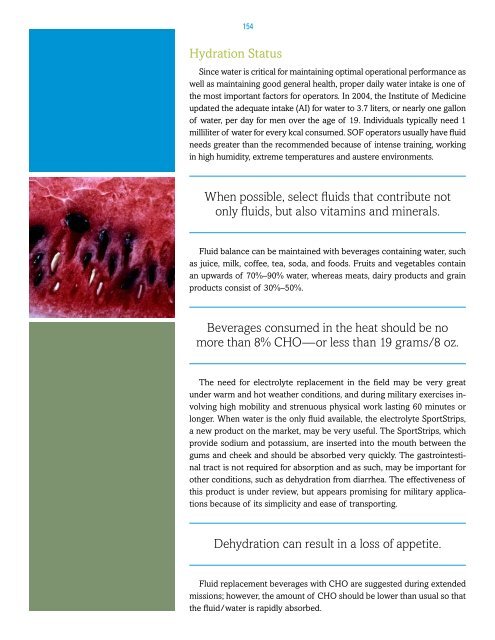special-operations-nutrition-guide
special-operations-nutrition-guide
special-operations-nutrition-guide
You also want an ePaper? Increase the reach of your titles
YUMPU automatically turns print PDFs into web optimized ePapers that Google loves.
154<br />
Hydration Status<br />
Since water is critical for maintaining optimal operational performance as<br />
well as maintaining good general health, proper daily water intake is one of<br />
the most important factors for operators. In 2004, the Institute of Medicine<br />
updated the adequate intake (AI) for water to 3.7 liters, or nearly one gallon<br />
of water, per day for men over the age of 19. Individuals typically need 1<br />
milliliter of water for every kcal consumed. SOF operators usually have fluid<br />
needs greater than the recommended because of intense training, working<br />
in high humidity, extreme temperatures and austere environments.<br />
When possible, select fluids that contribute not<br />
only fluids, but also vitamins and minerals.<br />
Fluid balance can be maintained with beverages containing water, such<br />
as juice, milk, coffee, tea, soda, and foods. Fruits and vegetables contain<br />
an upwards of 70%–90% water, whereas meats, dairy products and grain<br />
products consist of 30%–50%.<br />
Beverages consumed in the heat should be no<br />
more than 8% CHO—or less than 19 grams/8 oz.<br />
The need for electrolyte replacement in the field may be very great<br />
under warm and hot weather conditions, and during military exercises involving<br />
high mobility and strenuous physical work lasting 60 minutes or<br />
longer. When water is the only fluid available, the electrolyte SportStrips,<br />
a new product on the market, may be very useful. The SportStrips, which<br />
provide sodium and potassium, are inserted into the mouth between the<br />
gums and cheek and should be absorbed very quickly. The gastrointestinal<br />
tract is not required for absorption and as such, may be important for<br />
other conditions, such as dehydration from diarrhea. The effectiveness of<br />
this product is under review, but appears promising for military applications<br />
because of its simplicity and ease of transporting.<br />
Dehydration can result in a loss of appetite.<br />
Fluid replacement beverages with CHO are suggested during extended<br />
missions; however, the amount of CHO should be lower than usual so that<br />
the fluid/water is rapidly absorbed.


